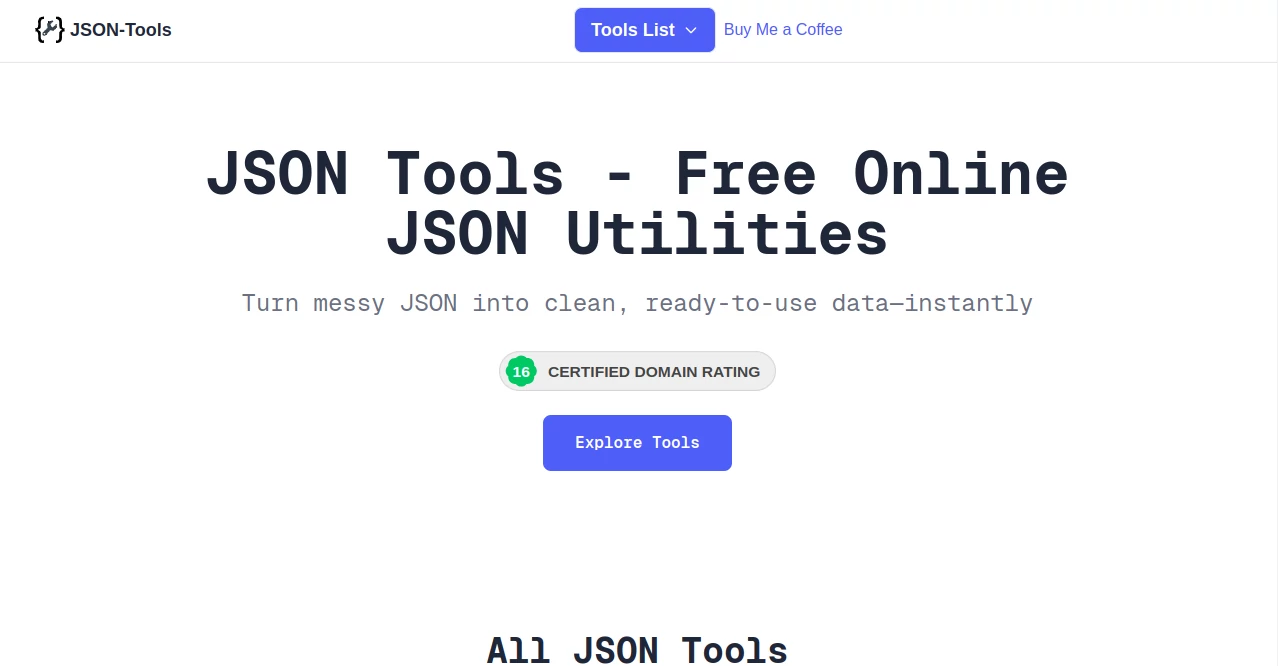🧠 AI Quiz
Think you really understand Artificial Intelligence?
Test yourself and see how well you know the world of AI.
Answer AI-related questions, compete with other users, and prove that
you’re among the best when it comes to AI knowledge.
Reach the top of our leaderboard.
JSON-Tools
Essential Utilities for JSON Handling

What is JSON-Tools?
JSON Tools serves as a handy collection of online helpers for anyone dealing with structured data formats, making it simpler to tweak, view, and convert files without pulling out heavy software. It's the kind of spot that developers and data folks bookmark for those quick fixes during a late-night debug or a midday merge. Users often point to how it cuts down on setup time, letting them focus on the bigger picture rather than wrestling with code just to peek inside a blob.
Introduction
JSON Tools grew out of the everyday headaches of working with nested data structures that trip up even seasoned pros. A developer, tired of switching between apps for basic tasks, threw together this suite to keep everything in one tab. Since then, it's pulled in a steady stream of tinkerers and team leads who appreciate the no-signup vibe and the way it handles common snags like malformed strings or bloated payloads. What draws people back is the quiet reliability—it doesn't overpromise, just delivers the nuts and bolts so you can get on with building something useful. Over the years, feedback from forums and quick shares has shaped it into a lean machine that feels like it was made for the moments when you need help, not a lecture.
Key Features
User Interface
Land on the page, and you're greeted by a row of clear buttons, each one leading straight to a dedicated workspace with a big text area front and center. Paste in your data, and controls for options like indentation or filters appear right below, no hunting through sidebars. It's all browser-based, so everything updates as you type, with previews that flip between raw and pretty views in a snap. The simplicity shines through—folks say it feels like chatting with a straightforward coworker who gets to the point without extra chatter.
Accuracy & Performance
It parses even the wonkiest nests without a hiccup, spotting errors like missing commas or quote mismatches with clear flags that point right to the trouble. Loads handle files up to a few megabytes in seconds, keeping things snappy whether you're on a laptop or a tablet. Developers testing it against bigger payloads note how it rarely chokes, delivering clean outputs that match what you'd get from command-line checks, all without draining your battery or bandwidth.
Capabilities
Dig into the lineup, and you'll find ways to tidy up messy strings into readable trees, slice out specific paths with query tools, or swap formats to XML for legacy handoffs. Validation runs deep, flagging schema drifts, while converters stretch to CSV for spreadsheet pulls or YAML for config tweaks. There's even a builder for crafting samples from scratch, complete with drag-and-drop for keys and values, making it versatile for everything from API mocks to data cleanup marathons.
Security & Privacy
Since it all happens in your browser, your data never leaves your machine—no servers to trust or logs to worry about. The scripts run client-side, so sensitive bits like API keys or user info stay put, and you can close the tab knowing nothing lingers. It's a setup that puts the control back in your hands, with no fine print about data grabs, which is why privacy-conscious coders give it a nod over cloud-heavy alternatives.
Use Cases
Frontend builders use the formatter to spruce up backend dumps before debugging, turning walls of text into navigable maps. Backend teams validate payloads during integration tests, catching slips that could crash endpoints. Analysts convert JSON logs to spreadsheets for quick reports, while educators pull it into classes to demo data flows without install hassles. Even hobby project folks whip up mock responses for app prototypes, proving it's as at home in a garage setup as a boardroom sprint.
Pros and Cons
Pros:
- Zero setup—just open and go, no accounts or downloads.
- Covers the core chores with solid, no-frills execution.
- Client-side processing keeps things private and speedy.
- Handles real-world messes that trip up fancier suites.
Cons:
- Sticks to basics, so mega-files might push browser limits.
- No team shares or saved sessions for collaborative flows.
- Offline quirks if your connection drops mid-use.
Pricing Plans
It's all on the house—no tiers, no catches, just open access to the full kit whenever you need it. The creator keeps it free through optional tips and links to pro tools, but for everyday use, you won't hit a paywall. This approach has kept it buzzing without the usual ad clutter, making it a rare gem in a world of freemium traps.
How to Use JSON Tools
Pick a utility from the top row, say the formatter, and drop your string into the box—watch it reshape as you adjust the depth or compact it down. For validation, paste and hit check; it'll underline issues with tips to fix them quick. Query paths with dot notation, extract what you need, and copy the result straight to your clipboard. String a few together for bigger jobs, like clean then convert, and you're set without leaving the page.
Comparison with Similar Tools
Desktop heavyweights like Postman pack more for full API runs, but they demand installs where this one stays light and web-ready. Against online rivals, it skips the sign-ups and ads that bog others down, though those might offer cloud saves for repeat visits. It holds its own for solo quickies, blending ease with enough depth to handle daily grinds without the extras that slow you down.
Conclusion
JSON Tools wraps up the scramble of data wrangling into a tidy package that just works, reminding us that sometimes the simplest fixes are the sharpest. It empowers tinkerers to tackle nests of info without the usual friction, turning potential headaches into handled tasks. In an era of bloated apps, this one's a breath of fresh code, proving you don't need bells to ring true for the folks who matter most.
Frequently Asked Questions (FAQ)
Does it work offline?
Core bits run in-browser, but first loads need a connection to pull the scripts.
What file sizes can it chew?
Up to a couple megs smooth, though bigger might nudge your browser's edges.
Can I build JSON from nothing?
Yep, the builder lets you stack keys and values step by step.
Is my data safe here?
Stays local—no uploads, no worries about where it wanders.
Any limits on use?
None at all; hit it as hard as your projects demand.
These classifications represent its core capabilities and areas of application. For related tools, explore the linked categories above.
















